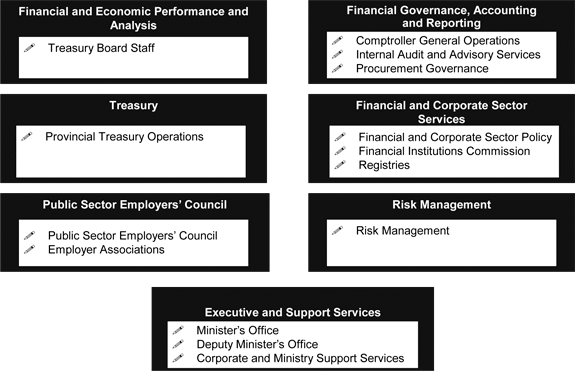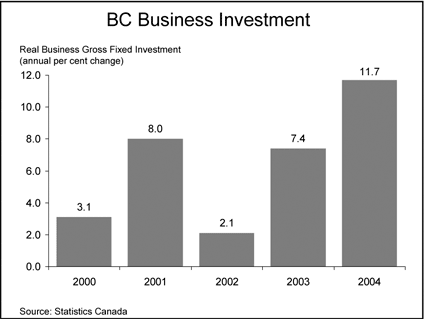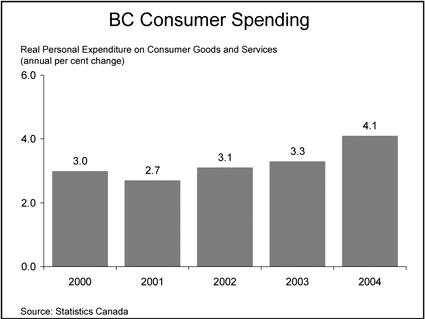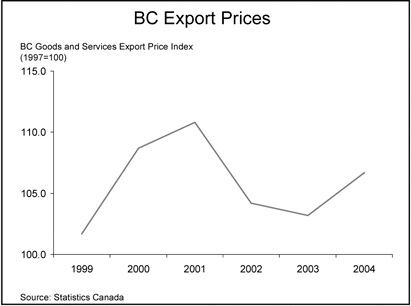 |
 |
 |
 |
|
|
 |
|
 |
 |
 |
 |
 |
ANNUAL SERVICE PLAN REPORTS 2004/05
Ministry of Finance
Ministry Role and Services
Vision
To be a responsive organization that is a model for leadership in promoting sound fiscal management and governance in an open
and accountable public-sector environment.
Mission
To develop a sustainable fiscal plan, to prudently manage government finances, and to create a sound policy and regulatory
framework that supports the creation of a strong and vibrant economy.
Values
|
Our Values are:
|
Our Leadership Philosophy is to:
|
Accountability
|
- Be accessible and responsive to our client needs.
- Measure and report on our performance at all levels.
- Recognize achievement and learn from our mistakes.
- Support a risk-based management system that encourages competency and performance based excellence.
- Focus resources and analysis on those activities that present the greatest opportunities or pose the greatest risk to the government’s fiscal and economic plan.
|
Innovation
|
- Explore new partnerships and ideas about how we do our business.
- Embrace technological change to capture new opportunities.
- Make strategic investments in our people.
|
Respect and Integrity
|
- Focus on our customers and clients.
- Provide leadership and encourage teamwork.
- Value diversity and differences of opinion.
- Protect confidentiality of information.
|
Trust and Honesty
|
- Keep our activities and outputs open and transparent.
- Respond to feedback from the public and our clients.
- Ensure clear and open communication.
|
Ministry Overview, Core Business Areas and Structure
Ministry Overview
The Ministry of Finance plays a key role in establishing, implementing and monitoring government's economic, fiscal and taxation
policies. The ministry provides a variety of functions and activities including banking, accounting, financial and economic
reporting, risk and debt management, regulating the financial and real estate sectors, and serving as the registrar of corporate
entities, personal property and manufactured homes. Through the Public Sector Employers' Council, which is chaired by the
Minister of Finance, the ministry also helps to co-ordinate labour relations policies and practices across the public sector.
The ministry's clients include Treasury Board, Cabinet, Government Caucus Committees, ministries, agencies, boards, commissions,
Crown corporations, businesses, investors and financial-sector agencies. Through its support of these clients, the ministry
also broadly serves the people of British Columbia.
Ministry Goals
The ministry uses five key goals to guide its activities:
- Implementing government's three-year fiscal plan and balancing the budget beginning in 2004/05.
- Creating a tax and regulatory climate that stimulates economic growth.
- Effective and efficient financial and risk management.
- Comprehensive, timely and transparent financial planning and reporting.
- A progressive, innovative and knowledgeable workforce.
These goals are discussed in greater detail beginning on page 23 of this report.
Core Business Areas and Structure
The ministry provides a wide range of functions related to our mandate of promoting sound fiscal management and governance
in the provincial government. In order to efficiently and effectively deliver these functions, the ministry has been structured
into seven core business areas. Each of these core business areas has specific responsibilities for the provision of programs
and services. The core business areas include:
- Financial and Economic Performance and Analysis.
- Financial Governance, Accounting and Reporting.
- Treasury.
- Financial and Corporate Sector Services.
- Public Sector Employers' Council.
- Risk Management.
- Executive and Support Services.
Collectively, these core business areas include all of the ministry's programs and services and directly contribute to at
least one of our goals.
Ministry Organization

Core Business Area 1: Financial and Economic Performance and Analysis.
Purpose
-
To provide prudent fiscal analysis and advice that supports the achievement of balanced budgets, improves the province's
business climate and sustains cost-effective public services.
Core Activities
- Develop the government's three-year fiscal plan and identify, assess, monitor and manage significant risks and opportunities
relating to the plan.
- Provide financial, economic, revenue, capital, tax policy, and intergovernmental fiscal relations advice to the Minister,
Treasury Board, Cabinet, Government Caucus Committees, government ministries and agencies, and other stakeholders.
- Manage the government budget and estimates reporting process.
- Produce the budget, estimates, quarterly reports, and the budget consultation document; as well as internal reports and
related analysis.
- Create the best opportunity for the Province to influence the level and structure of federal funding by ensuring BC's interests
are represented at federal-provincial and inter-provincial negotiations of federal-provincial fiscal arrangements (e.g., health
and social transfers, equalization).
- Collaborate with the Crown Agencies Secretariat in the evolving governance and reporting relationships between Crown corporations
and agencies and the Minister of Finance to provide timely notice of changing financial outlooks that could affect the government's
fiscal plan.
- Collaborate with the Ministries of Health Services, Advanced Education and Education in the evolving governance and reporting
relationships between the Minister of Finance and the SUCH sector (Schools, Universities, Colleges, and Health Authorities)
to provide timely notice of changing financial outlooks that could affect the government's fiscal plan.
- Work with client ministries and agencies on government strategic projects including public private partnerships and, alternative
service delivery initiatives to ensure maximum return and value for money for the taxpayers of British Columbia.
Core Business Area 2: Financial Governance, Accounting and Reporting.
Purpose
To assure the accuracy and integrity of provincial public sector financial reporting and maintain a framework of best practices
for financial and procurement management.
Core Activities
-
Prepare and publish the
Public Accounts and contribute to other financial reports for timely reporting, decision-making, and financial transparency, and work with
the Auditor General and accounting standards organizations on appropriate accounting standards and their application to the
province.
- Provide financial and procurement management regulation by establishing streamlined legislation, policies, and procedures
that define the framework for government, and provide assurance that the framework is operating as intended.
- Provide risk based internal audit services to support ministry and cross-government performance. Monitor management's implementation
of audit recommendations and increase communication with stakeholders.
- Provide accounting policy advice and analysis to ministries, Crown corporations, agencies and the schools, universities,
colleges and health authorities (SUCH) sector, resulting in financial information that is consistent with Generally Accepted
Accounting Principles.
- Provide accounting advice on public private partnerships (P3s), alternative service delivery and other financing proposals
to assess their accounting and reporting impacts.
- Provide a leadership role in the cross-government implementation of electronic procurement through governance frameworks
and business process reviews.
- Apply a risk-based approach and other leading management practices to managing government resources that minimizes administration
costs and preserves appropriate financial and procurement controls.
- Identify policy, systems and training issues and recommend systemic improvements by monitoring compliance with financial
and procurement policy.
Core Business Area 3: Treasury.
Purpose
-
To provide British Columbians with the benefits of cost effective debt management and banking resulting in lower expenditures
and to improve online government services through electronic banking support.
Core Activities
- Deliver cost effective banking, cash management, and electronic banking services to ministries, Crown corporations and government
agencies.
- Ensure the borrowing needs for the provincial government and its agencies are met, provide support for corporate and project
finance initiatives, and efficiently manage debt, settlement operations, and reporting.
- Manage investor relations initiatives and act as the primary liaison with domestic and international credit rating agencies.
- Provide a three-year debt servicing plan as well as monthly, quarterly and annual debt reporting and forecasts for the provincial Quarterlies, Public Accounts and provincial Budget.
- Provide financial advisory services to support alternative service delivery and public private partnerships projects.
Core Business Area 4: Financial and Corporate Sector Services.
Purpose
-
To ensure that the province's financial services sector is reliable, competitive and enjoys the confidence of British Columbians
and to provide personal property and corporate registry services that meet the needs of the marketplace.
Core Activities
- Oversee the financial services and real estate sectors including:
- operation of the Financial Institutions Commission (FICOM) and the Credit Union Deposit Insurance Corporation;
- regulation of credit unions, trust companies, pension plans, insurance companies, captive insurance companies, and insurance
licensees;
- regulation of real estate licensees and mortgage brokers; and
- provision of policy analysis and advice to government in support of legislative frameworks for the regulation of the province's
financial services, real estate, corporate, and commercial sectors.
- Operate registries services including:
- registration of all business entities, non-profit organizations, and co-operatives that operate in British Columbia.
- maintenance of registries of security interests (liens) in personal property and of the ownership and location of manufactured
homes in the province.
-
Manage the
OneStop Business Registry. Established as a public sector partnership involving the three levels of government, Workers Compensation Board of British
Columbia, and the business community, the registry provides integrated services to business and significant cost savings to
the public and private sectors through:
- Business Number — a service that provides the ability for each business interacting with the public sector in BC to be assigned a Business
Number (BN) — a unique identifier that makes working with the federal, provincial and municipal levels of government simpler,
easier and more convenient, while improving service and voluntary compliance levels for public sector partners.
- Business Registration — a service that enables a business to register with multiple public sector agencies in one step.
- Business Address Change — a service that enables a business to notify multiple public sector agencies of an address change, in one step.
Core Business Area 5: Public Sector Employers' Council.
Purpose
-
To foster an efficient and effective workforce through the coordination of public sector labour relations policies and practices.
Core Activity
-
Set and coordinate strategic directions in human resource management and labour relations and advise government with respect
to labour relations and pension and benefits issues in the provincial public sector.
Core Business Area 6: Risk Management.
Purpose
-
To reduce accidental and business losses in the provincial public sector through the development of comprehensive risk management
and self-insurance programs.
Core Activities
- Provide risk management services in the areas of risk identification and assessment processes, risk transfer, risk financing,
risk mitigation, claims/litigation management, and security and business continuity planning.
- Develop and manage comprehensive risk management programs that seek to minimize the risks the provincial public sector faces
by virtue of its programs, operations and assets, including public education, health care, Crown corporations, and other public
entities.
Core Business Area 7: Executive and Support Services.
Purpose
-
To provide strategic leadership and corporate support services that contributes to the success of all core business areas.
Core Activities
- Executive and administrative support to the Minister and Deputy Minister of Finance's offices.
- Strategic support to the Ministry of Finance as well as the Ministry of Management Services, Ministry of Provincial Revenue,
Office of the Premier, BC Public Service Agency, Government House and other public sector entities. Service areas include
finance, human resources, information management, and information access and records services.
- Support implementation of the ministry's new Integrated Planning Framework, which consolidates key planning functions (budgeting,
service planning, risk management, human resources and information technology) across the ministry.
Ministry Operating Context
Provincial Economy
The British Columbia economy grew 3.9 per cent in 2004, leading all provinces, after growth of 2.5 per cent in 2003. Domestic
activity continued to be the main driver of economic growth last year. Business investment grew by 11.7 per cent. Growth in
housing starts of 25.8 per cent in 2004 led to residential construction investment growth of 14.8 per cent. Additionally,
machinery and equipment investment, supported by a stronger Canadian dollar, saw growth of 20.0 per cent in 2004. Consumer
spending, which accounts for about two-thirds of all economic activity in the province, grew 4.1 per cent in 2004, supported
low interest rates and strong employment growth of 2.3 per cent in 2004. Despite the continued rise of the Canadian dollar
against the U.S. dollar in 2004 total exports of goods and services grew by 4.9 per cent. Imports of goods and services grew
by 6.4 per cent in 2004.


External Factors
Commodity Prices
Commodity prices for most natural resources including oil, natural gas, lumber and pulp and paper fluctuated considerably
over the course of the year. Overall, prices for BC's exports grew at an average rate of 3.4 per cent in 2004.


Canadian Dollar
The Canadian dollar averaged 76.8 cents US in 2004, up from 71.4 cents in 2003. The dollar ended the year strongly averaging
82.0 cents US in December 2004. The strong Canadian dollar in 2004 was due in part to U.S. dollar weakness, resulting from
concerns surrounding the ability of the U.S. to finance its large current account and budget deficits. The negative effects
of a higher Canadian dollar on BC exports were partly offset by higher commodity prices in 2004. The upside of the higher
Canadian dollar is that consumers benefit due to increased purchasing power and businesses that invest in foreign machinery
and equipment can take advantage of lower costs. For example, business investment in machinery and equipment rose 20.0 per
cent in 2004, up from 1.3 per cent in 2003.

Softwood Lumber Dispute
Countervailing and anti-dumping duties imposed by the United States on Canadian softwood imports in May 2002, totaling 27
per cent, continued to weigh on the province's forest industries and the communities and families they support.
Federal Funding
Federal funding to the province increased significantly in 2004/05 due to agreements on healthcare and equalization formulas.
Government-wide
Program Demand
There has been an increase in the demand for public services in British Columbia due to a number of factors, including population
growth and infrastructure requirements. In 2004, population grew by 1.1 per cent due to both increased migration into the
province as well as a natural internal increase. This increase in population combined with the infrastructure needs of a growing
economy have put additional pressures on health, social services and other programs.
Revenues
Strong provincial economic growth supported by federal funding and higher forestry and natural gas prices resulted in higher
than projected revenues for 2004/05. These additional revenues contributed to the government's $2.6 billion surplus in 2004/05
and also allowed a $1.94 billion pay down of the provincial debt.
Ministry Specific
Expanded Fiscal Mandate
Government's move to fully comply with GAAP, integration of the Schools, Universities, Colleges and Health Authorities (SUCH)
sector into the Government Reporting Entity significantly impacted existing practices and workloads within the ministry. Two
core businesses in particular were affected, due to the nature of their work: Financial and Economic Performance and Analysis;
and Financial Governance, Accounting and Reporting.
The resulting additional workloads and on-going accommodation of evolving financial standards were successfully managed within
budget and on schedule through:
- strengthened partnerships with members of the SUCH sector;
- standardized policies, procedures and financial training;
- expansion of financial systems to affected entities;
- effective project management practices; and,
- dedication and expertise of ministry staff.
New Era
Commitments Made
Since 2001, the Ministry of Finance has achieved each of the 28
New Era
commitments assigned to the ministry. Following is a list of the 28 items achieved:
- Conduct a comprehensive audit of the province's finances within 90 days and make results public.
- Introduce a dramatic cut in personal income taxes within first 90 days.
- Increase funding for Auditor General's office to help identify and prevent waste and increase value for money.
- Eliminate the use of special warrants.
- Establish service plans that include measurable performance standards and targets for all programs that are annually audited
and published.
- Require Crown corporations to be directly accountable to a committee of the legislature for their financial management and
budget plans.
- Phase out taxes on investment and productivity in keeping with our commitment to balance the budget and protect health care
and education funding.
- Pass real balanced budget legislation to make balanced budgets mandatory by our third full budget (2004/05) and to hold
all ministers individually accountable.
- Pass real Truth in Budgeting legislation that ensures all provincial finances are fully, accurately and honesty reported
under generally accepted accounting principles.
- Establish a fixed date for the tabling of the provincial budget.
- With Core Review introduce greater competition in auto insurance to create increased choice and reduce motor vehicle premiums.
- With the Ministries of Health Planning and Education, protect funding for health care and education and increase funding
as economic growth increases government revenues.
- With the Ministry of Education, maintain current funding arrangements for independent schools.
- With the Ministry of Advanced Education, support the current five per cent tuition cut and tuition freeze and fully fund
it in the current fiscal year to offset costs to post-secondary institutes.
- Give school boards multi-year funding envelopes to improve long term education planning and budgeting.
- Eliminate the provincial sales tax on basic school supplies purchased by parent advisory councils.
- With the Ministry of Advanced Education, increase research funding for colleges, universities and institutes.
- With the Ministry of Health Planning:
- Maintain current $9.3 billion budget for Health;
- Provide health regions with 3-year rolling funding commitments, updated annually;
- Fund health regions at a level necessary to meet needs; and
- Fulfill B.C.'s obligations under the Canada Health Act to properly fund and provide access to all medically necessary services.
- With the Ministries of Health Planning and Health Services, fully fund the $125 M mental health initiative.
- With the Ministries of Health Planning and Health Services, protect current funding to abortion services.
- With the Intergovernmental Relations Secretariat, work with the federal government to ensure that our tax treatment of stock
options and capital gains is globally competitive.
- With the Intergovernmental Relations Secretariat and Community Ministry, increase First Nations program funding, together
with federal government, to solve urban challenges and build capacity.
- With Community Ministry, double First Citizens Fund to $72 million to support native friendship centres, student bursaries
and economic development programs.
- With Forestry, apply one per cent of all direct forest revenues, not including super stumpage, to global marketing of B.C.'s
forest practices and products.
- With Forestry, return super stumpage revenues to the areas that produce the wealth.
|
